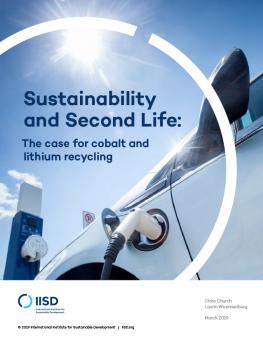
Sustainability and Second Life: The case for cobalt and lithium recycling
Adopting recycling in the mining sector and in supply chains is essential to ensure the transition to a low-carbon economy is responsible and sustainable for the longer term.
Adopting recycling in the mining sector and in supply chains is essential to ensure the transition to a low-carbon economy is responsible and sustainable for the longer term.
Key Messages
- Interest in renewable technologies (such as electric vehicles, solar panels and wind turbines) has increased demand for cobalt and lithium. However, global supplies of both minerals are not projected to meet demand, with research forecasting shortfalls in the coming decade.
- Extracting cobalt and lithium from old products and infrastructure is essential to heading off predicted metal shortfalls, empowering clean energy transitions and reducing risk of human exploitation.
Interest in renewable technologies (such as electric vehicles, solar panels and wind turbines) has increased demand for cobalt and lithium.
However, global supplies of both minerals are not projected to meet demand, with research forecasting shortfalls in the coming decade.
Lithium and cobalt recycling, conducted in a responsible and transparent way, could help head off metal shortfalls while reducing pressure on mining communities vulnerable to exploitation. However, recycling rates remain low due to a lack of transparency in recycling supply chains; manufacturers purchasing substitute minerals due to high prices for raw cobalt and lithium; and inefficient collection of cobalt and lithium from existing infrastructure, to name a few.
Sustainability and Second Life: The Case for Cobalt and Lithium Recycling’s recommendations include:
- Increased transparency and responsible sourcing along primary and recycling supply chains
- Enhancing the eco-design of products containing lithium and cobalt
- Raising consumer awareness regarding current collection and recycling schemes
- New or revised investments to improve collection infrastructure, technology development and knowledge creation
- Clearly designating the actors responsible and liable for recycling materials
Participating experts
Additional downloads
You might also be interested in
Senegal's Big LNG Gamble
This report explores Senegal's nascent liquefied nitrogen gas (LNG) industry by assessing the impacts associated with a new fossil fuel-based industry on the country's environment, economy, and society. It does this by responding to three questions: What have been the impacts of the development of LNG on Senegal to date? Is it viable for Senegal to invest further into an industry that is projected to decline? What risks can Senegal expect should it forge ahead with its LNG development plans?
Budgeting for Net Zero
This study estimates the cost gap for battery energy storage systems (BESSs), offshore wind, solar photovoltaic (PV), electric vehicles (EVs), and green hydrogen (GH2) to inform government support.
Artisanal and Small-Scale Mining of Critical Minerals
This report examines the potential for artisanal and small-scale mining (ASM) to take an expanded role in the global supply of critical minerals.
Plastics Treaty Must Remain Ambitious — We Can’t Give Up Now
The last round of the plastics treaty negotiations in Busan, South Korea, did not result in a deal, but the momentum is palpable. We must seize this opportunity and keep working toward an ambitious treaty that addresses the entire plastics life cycle.